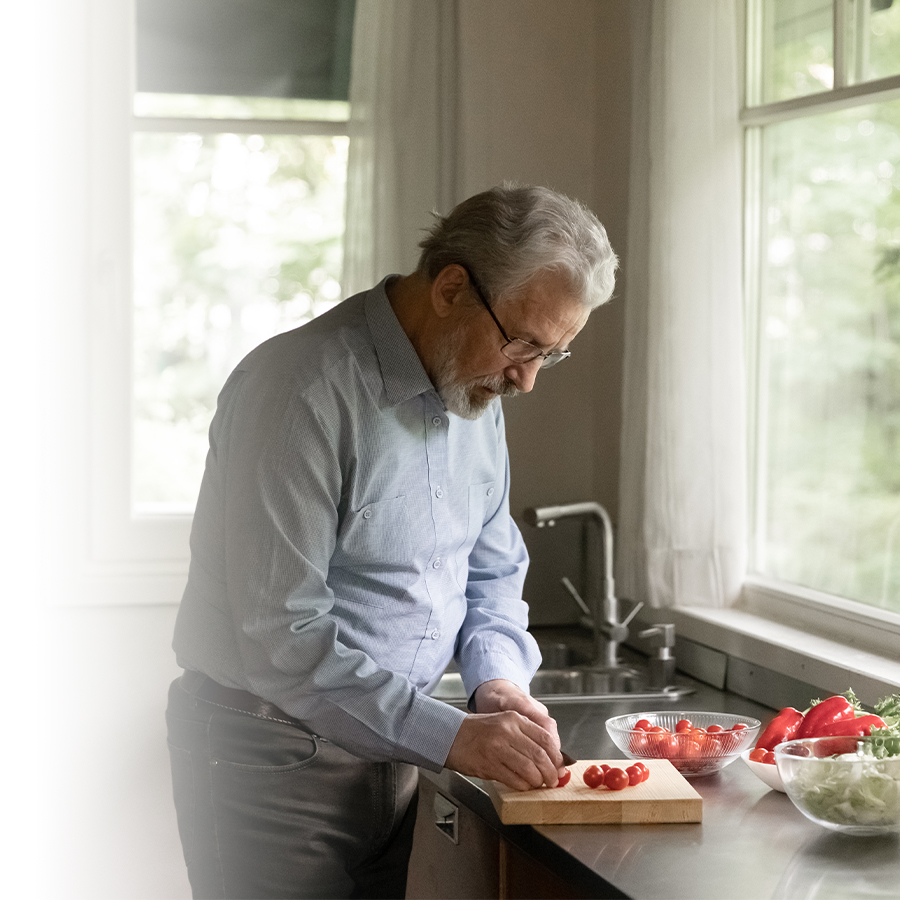Some cancers can be prevented by making lifestyle changes. This is the case with prostate cancer.
What is prostate cancer?
The prostate is a gland the size of a walnut. It is located below the bladder and surrounds the urinary tract. For men, the prostate is essential for the production of sperm, and consequently, for reproduction. In Canada, prostate cancer is the most prevalent type of cancer in men. Moreover, it is the third leading cause of death by cancer in Canadian men.
However, it generally progresses slowly and can often be successfully cured or treated. The earlier it is detected, the better the response to treatment and chances of recovery.
Am I at risk?
For most types of cancer, a number of things can be identified that may predispose a person to develop it. These are called “risk factors”. Some risk factors have been identified for prostate cancer. There are two main types: those that can be modified and those that cannot.
Here are a few examples of risk factors that cannot be modified:
- age: men who are 50 years and older have a higher risk of prostate cancer and those who are 65 years and older have an even higher risk
- family history: your risk is higher if your father or one of your brothers has had prostate cancer
- ethnic origin: your risk is increased if you are Afro-American, it is reduced if you are Asian
- height: taller adult men have a higher risk
How can prostate cancer be prevented?
The good news is that you can work to reduce your risk by acting on certain factors that can be modified. In this perspective, it may be wise to adopt or modify the following lifestyle choices:
- Reduce your fat intake. It has been suggested that eating too many high-fat foods can increase the risk of prostate cancer. Red meat and processed meats in particular have been singled out. Limit your intake of these foods or choose those that are lower in fat. This has many other health benefits as well.
- Eat enough dairy products (milk, yogurt, cheese, etc.), but not too much. In addition to containing fat, dairy products also contain calcium. It has been suggested that a daily intake of more calcium than is necessary may increase the risk of prostate cancer. If for any reason you are considering taking a calcium supplement, consult a health care professional (doctor, pharmacist or dietitian/nutritionist) first.
- Follow Canada's Food Guide. Everyone knows the importance of a healthy diet for good health. Basing your food choices on Canada's Food Guide will help ensure that your needs for essential nutrients such as vitamins and minerals are met. Eating plenty of fruits, vegetables, legumes, nuts, whole grains and fish can be a beneficial strategy for preventing many diseases. Additionally, a healthy, balanced diet will help you maintain a healthy weight. Being overweight and obese are also risk factors for prostate cancer.
- Eat more tomatoes. Some scientific studies suggest that eating more foods rich in the antioxidant nutrient “lycopene” may help to prevent the development of prostate cancer. Tomatoes are an example of a food that contains it.
- Quit smoking. As you probably know, smoking increases your risk of developing several types of cancers, including prostate cancer. In addition to reducing your risk in this regard, quitting smoking for good can have many other benefits for your health, well-being, and quality of life.
What else can I do to stay healthy?
Visit your doctor regularly. The best way to limit the impact prostate cancer can have on your life is early detection. Speak to your doctor about your risk of prostate cancer and what you can do to get screened. Prostate cancer screening can be done with two complementary tests. First, the doctor may do a digital rectal exam. Second, a blood test can detect the elevation of PSA, the prostate specific antigen. Both of these tests are not performed on all men, but are recommended for some, namely men who are at least 50 years old or younger men who have a higher risk level.
Admittedly, prostate cancer is a threat to men's health. But isn't it reassuring to know that there are steps you can take now to prevent it? Ask your doctor or pharmacist for more information.

